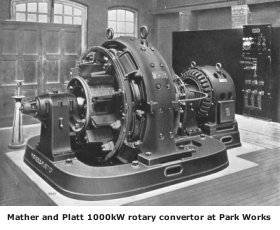Home » Mather + Platt » Works shutdown
Works Shutdown
 Every summer the works would have a two week shutdown period during which many of the shopfloor
employees were expected to take their annual holiday. Office and maintenance staff usually worked
during this period. For the maintenance staff, this was a busy time when planned maintenance
could take place on many of the larger machine tools, infrastructure services such as power supplies and transformers,
gantry cranes, compressors and so on.
Every summer the works would have a two week shutdown period during which many of the shopfloor
employees were expected to take their annual holiday. Office and maintenance staff usually worked
during this period. For the maintenance staff, this was a busy time when planned maintenance
could take place on many of the larger machine tools, infrastructure services such as power supplies and transformers,
gantry cranes, compressors and so on.
 The DC supply for the gantry cranes was provided by a 1000kW rotary convertor located in the Power House.
This took a 50Hz 3-phase 6500V supply and converted it into DC on a three-wire system at 440 and 220 volts.
When you went into the Power House it was always warm because of the losses in the machines. There was a smell of
warm oil and of electrical insulation. The rotary convertor made a noise that was somewhere between a hum and a
buzz - this being the sound of the carbon brushes on the commutator.
The DC supply for the gantry cranes was provided by a 1000kW rotary convertor located in the Power House.
This took a 50Hz 3-phase 6500V supply and converted it into DC on a three-wire system at 440 and 220 volts.
When you went into the Power House it was always warm because of the losses in the machines. There was a smell of
warm oil and of electrical insulation. The rotary convertor made a noise that was somewhere between a hum and a
buzz - this being the sound of the carbon brushes on the commutator.
Maintenance on the DC supply involved cleaning the underfloor busbar insulators. The duct was about 3í wide and about 2í deep and covered by thick wooden beams which formed part of the factory floor. It was located about halfway across the width of the factory and ran its length. The busbars were of 2" square copper and supported on porcelain insulators, very similar to those seen on the London Underground. The insulators were mounted on brackets that were fixed to one side of the duct.
Cleaning the insulators was done with a bucket of Genklene and a handbrush but because the wooden beams were only lifted in a couple of places, the cleaning crew had to crawl underneath them to visit the otherwise inaccessible insulators. Although the power was locked off, a heavy chain was wrapped around the busbars so that if the power was switched on again accidentally, the breaker should trip out immediately because of the short. One always pondered two questions
- whether the position of the chain was important - should it be between you and the supply or didnít it matter
- whether the chain was in sufficient contact with the busbars and itself to properly conduct and not just make momentary contact before arcing out.
Another task was replacing the bearings on the threading machines in 18-Bay. These machines had three rotating spindles arranged in a horizontal T-shape that could thread cast iron T-pieces, elbows, straight couplings and crosses. Each machine had its own supply of emulsion coolant and the seals on the spindles tended to leak after prolonged use. Consequently, the coolant seeped into the bearings, made them rust and created wear that would result in a reduction in accuracy.

